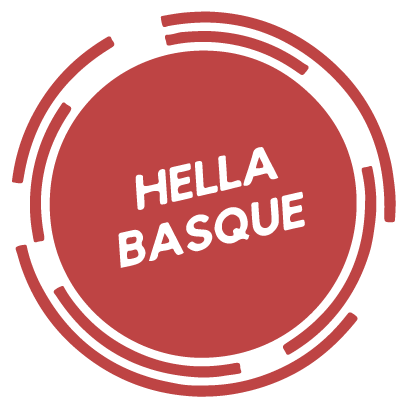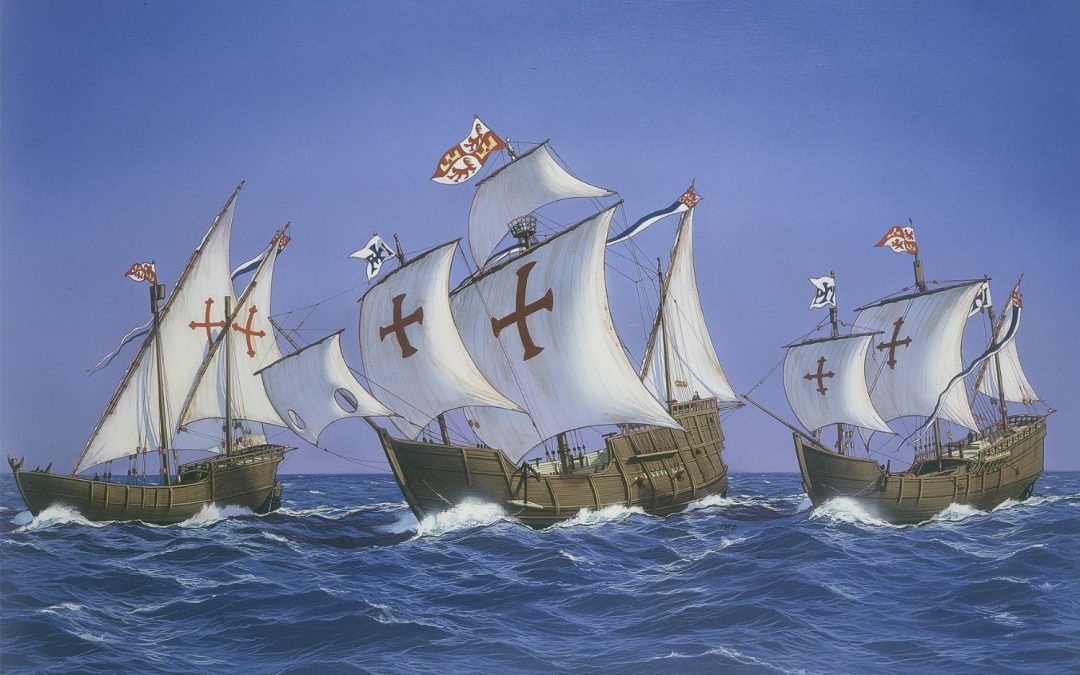This post contains affiliate links, meaning if you click through and make a purchase, I may earn a commission at no additional cost to you. As an Amazon Associate I earn from qualifying purchases. If you enjoy the content on Hella Basque, please consider supporting.
Today is Indigenous Peoples’ Day. You may know it as Columbus Day.
As an American, I am ashamed on this day for our history as a country.
As a Basque American, even more so.
Let me explain.
Growing up in American schools, we didn’t learn much about the genocide and abuse of Native Americans throughout US history. Only in high school did the curriculum start to touch on these issues, but even then it was for a brief discussion of smallpox blankets and a unit on The Trail of Tears. Then we all moved on to other things.
Until that point in my education, it had all been happy relations between Pilgrims and Indians for Thanksgiving celebrations and the “cooperation” of Native Americans in “helping” Spanish monks build up California in the colonial Mission system.
Not a word on rape, murder, execution, massacres, genocide, enslavement, forced Christianization, forced removal, transgenerational trauma, cultural appropriation, and the numerous other inhuman acts European colonizers committed against Native Americans.
The little knowledge I have on these topics (I do not by any means claim to be an expert) has to do with readings I did outside of American education.
But for years growing up, whenever I learned of the abuse of Native Americans, I felt some small sense of security that at least my people were not colonizers.
My family were recent immigrants to the United States and had no role in stealing Native American lands and oppressing their cultures and languages. For centuries my family were stuck in rural France, working the land, and being oppressed in their own way by the French monarchy and subsequent Republics. Right?
But every once in a while I would hear Basque people mention something about how the men who sailed with Christopher Columbus were Basque, that Columbus’ ships were made in the Basque Country. One theory even holds that Columbus himself was Basque.
And others in the conversation would nod and say things like, “That makes sense, Basques were the best sailors! The best shipbuilders!”
Not to disrespect Basque innovation and skill as mariners and shipbuilders, but I do not see these facts, in this context, as something to be proud of.
Sure, it’s great that the Basques had special skills that helped them thrive economically and survive as a people. But to use those skills in the service of getting rich and powerful by raping, enslaving, and murdering indigenous people halfway across the world?
That’s not something I would be bragging about.
I hoped perhaps these claims were exaggerated, so I’ve done a little research.
Basques and the Colonization of the Americas
Unfortunately, it is true that many of Columbus’ men were from the Basque Country and some of his ships were built in the Basque Country.
Many of the journeys to the Americas were funded by Basque enterprises.
And many of the conquistadors destroying Native communities in the name of the Spanish crown were Basque. Quite a few Basque men made a lot of money out of colonizing the Americas.
You can find a sickeningly long description of the Basque men involved in this colonial project (and a sanitized account of the atrocities they committed) in this article.
As a member of the Basque diaspora, I am often tempted to brag about the Basques and their accomplishments. I read the news and recent history about how the Basques have been and in some ways continue to be oppressed by the Spanish and French governments.
When taking this short view of history, it’s easy to think of ourselves as underdogs.
But on this day, I think about how life and history aren’t that black and white.
Have Basques been oppressed? Absolutely.
Have Basques oppressed others? Undeniably yes.
It is possible for us to be oppressed and discriminated against in certain ways but also exceedingly privileged and harmful to others at the same time. Sometimes in ways that we’re blind to.
I think it’s especially important for us to recognize the role Basques played in Spanish colonization of the New World because Basques are sometimes described as “indigenous people of Europe.” Some Basques make connections between the abuses against Native Americans with the oppression Basques have been subjected to in Europe, while glossing over how Basques themselves were involved in subjugating Native peoples.
We need a more nuanced understanding of Basque history, one that doesn’t solely serve a nationalist agenda of Basques = good, Spanish and French = bad.
Sometimes we Basques haven’t been all that great ourselves.
If you’re thinking to yourself, “But that was all in the past…”
As Basques we remember the mistreatment and murders of our ancestors.
We commemorate and mourn the bombing of Gernika every year in April. We study the witch trials of Zugarramurdi. We still decry the horrors and lasting impact of Franco’s dictatorship on the Basque Country.
Imagine if Basques had survived the extent of violence Native American peoples have. What would that do to us as a a people? As individuals? We without a doubt would remember.
I urge you to watch this powerful video about what the name Christopher Columbus means to Native Americans today:
Now what can we do with this knowledge?
I don’t bring this up today to make us all feel guilty or sad about the heinous acts committed by Basques centuries ago. Although those feelings are valid.
I do it to raise awareness, to educate us about an aspect of our history that is less than noble, and to inspire action to spread some good deeds in the world.
Please consider giving to Native American nonprofit organizations working to uplift Native communities. You can find a curated list of agencies here. Also, please read through this article on how you can help Native Americans in small, everyday actions.
And if nothing else, please remember to treat people different from you with compassion and empathy. As Basques, let us not go back to a place where we think of ourselves as better or more deserving than any other group of people. Let’s aim to do better than our forefathers.
CONTINUE READING:
- How Many People in the Basque Country Actually Speak Euskara?
- Why Some Basque Baby Names Are Illegal in France and the United States
- Go Back in Time with this Documentary on the Basque Country by Orson Welles


Using those reasons fir Not being proud of the accomplishments made by early Basques is like being a direct descendant of the wright brothers and living in shame because terrorists used airplanes on 9-11 to attack the USA
The Basque girl who wrote this article is a traitor to her own race and weak soul who obviously is another ordinary puppet of the jews.It is a biological imperative of each race to look out for and favor their own.The fact that she is promoting donations for and uploading videos of another race blaspheming her own people is enough for any strong Basque soul reading this article to dismiss her as a race traitor rat.In older times she would of been hanged.
That is the most racist remark I might have ever heard.
Yeah so what? “Racist remark” is the only 2 word counter argument you have. In other words,you know NOTHING,are absolutely incompetent and one of those pipsqueak non violent NPCs that come on comments and talk a bunch of pitiful,weak garbage that can easily be shut down and dismissed by people like me.STOP now before you get even more punked.
I am responsible for everything I do in this life. You are not responsible for me, nor I for you. Holding people responsible for the acts of others because they are of the same class, nation, race, or gym class in the end relieves all of us of self-responsibility: there’s always something else or someone else we can point to. Since we can only be responsible for what we do, blame shifting doesn’t lead anywhere productive.
You are so right . Ever since Cain killed his brother Abel , people have harmed their fellow man . It’s horrible but it’s been happening and unfortunately will still happen
So very sad , but as long as when Cain killed Abel , that’s what people do to each other, no what what nationality they are !